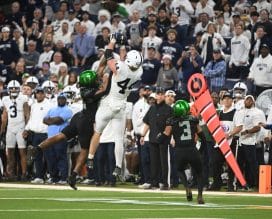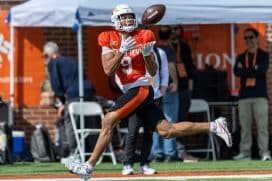Flyers
What Kind of Contract Could Kevin Hayes Get from Flyers?
By Kevin Durso, Sports Talk Philly editor
The Flyers got a jump start on their offseason right in the middle of the first period of Game 4, acquiring the rights to free-agent forward Kevin Hayes.
Hayes would fill the need for a second-line center for the Flyers, one of the many items on the offseason to-do list and holes to fill on the roster. Would…if he signs with the Flyers prior to July 1.
There are no guarantees, though these deals usually show a team’s confidence in getting a deal done and the Flyers have a history of doing this in the past, signing the likes of Kimmo Timonen, Scott Hartnell, Ilya Bryzgalov and Mark Streit all before they formally entered free agency.
So assuming Hayes is going to sign with the Flyers, what would the contract look like and what would it do to the Flyers open cap space?
Let’s start with the easier part to predict: term. The Flyers can sign Hayes to a maximum seven-year contract. Given that Hayes is 27 and entering the prime of his career, a seven-year deal isn’t out of the question, though there is also a sense the Flyers don’t want to fall into a trap where they are locked into immovable deals — see MacDonald, Andrew.
That said, GM Chuck Fletcher mentioned going out and possibly finding players just like Hayes, still young — around 26 years old — and capable of being locked up for five or six years to solidify a role.
A five-year deal will likely be a starting point for Hayes and his camp.
The term shouldn’t be something the Flyers should worry about. Even if the Flyers sign Hayes to a five or six-year deal, there is flexibility with his role. Acquiring Hayes should take some of the pressure off of 20-year-old Nolan Patrick, who just completed his second season and figures to slot into the third-line center role in his third season. This will give him some relief from the pressures that come with being a Top-6 forward in terms of point production. If it helps his game grow now and eventually vaults him into the second-line role, Hayes can assume the third-line role as he approaches the second half of his career.
The money is a lot less predictable. There is a good benchmark though.
A few weeks ago, the Islanders re-signed center Brock Nelson to a six-year, $36 million deal. That seemed to set the tone for the price of a second-line center toward the top of the free-agent class. Nelson is not as well-rounded a player as Hayes is and Hayes is coming off a season where he set a career high with 55 points combined between the New York Rangers and Winnipeg Jets, so the price tag could be even higher for Hayes. You have to figure that any deal would at minimum start at the $6 million average annual value.
Hayes is also coming into free agency off a very different contract from Nelson. Nelson had a cap hit of $4.25 million last season. Hayes had a cap hit of $5.125 million.
The Flyers enter the offseason with a projected $33.4 million in available cap space, but Hayes isn’t their only order of business with that money. They have five restricted free agents who figure to be on the roster next season — Ivan Provorov, Travis Konecny, Travis Sanheim, Scott Laughton, Ryan Hartman — and want to potentially add a Top 4 defenseman and a scoring winger. They also need to sign a backup goalie to Carter Hart. Both Cam Talbot and Brian Elliott are unrestricted free agents under the Flyers control until July 1.
A cap hit in the range of $6-7 million for Hayes would bring the projected cap space down to between $26-27 million. That’s what the Flyers would have to work with on potentially signing eight additional players.
It’s a fine line to walk, but center depth is crucial and Hayes can fill a few voids, both up the middle at even strength and in a penalty-killing role. He can also get power play time and brings a lot of size — Hayes is 6’5” — to the Flyers lineup.
It’s a trade that made a lot of sense for the Flyers. Now they have to make a deal with Hayes that makes sense for them as well.





